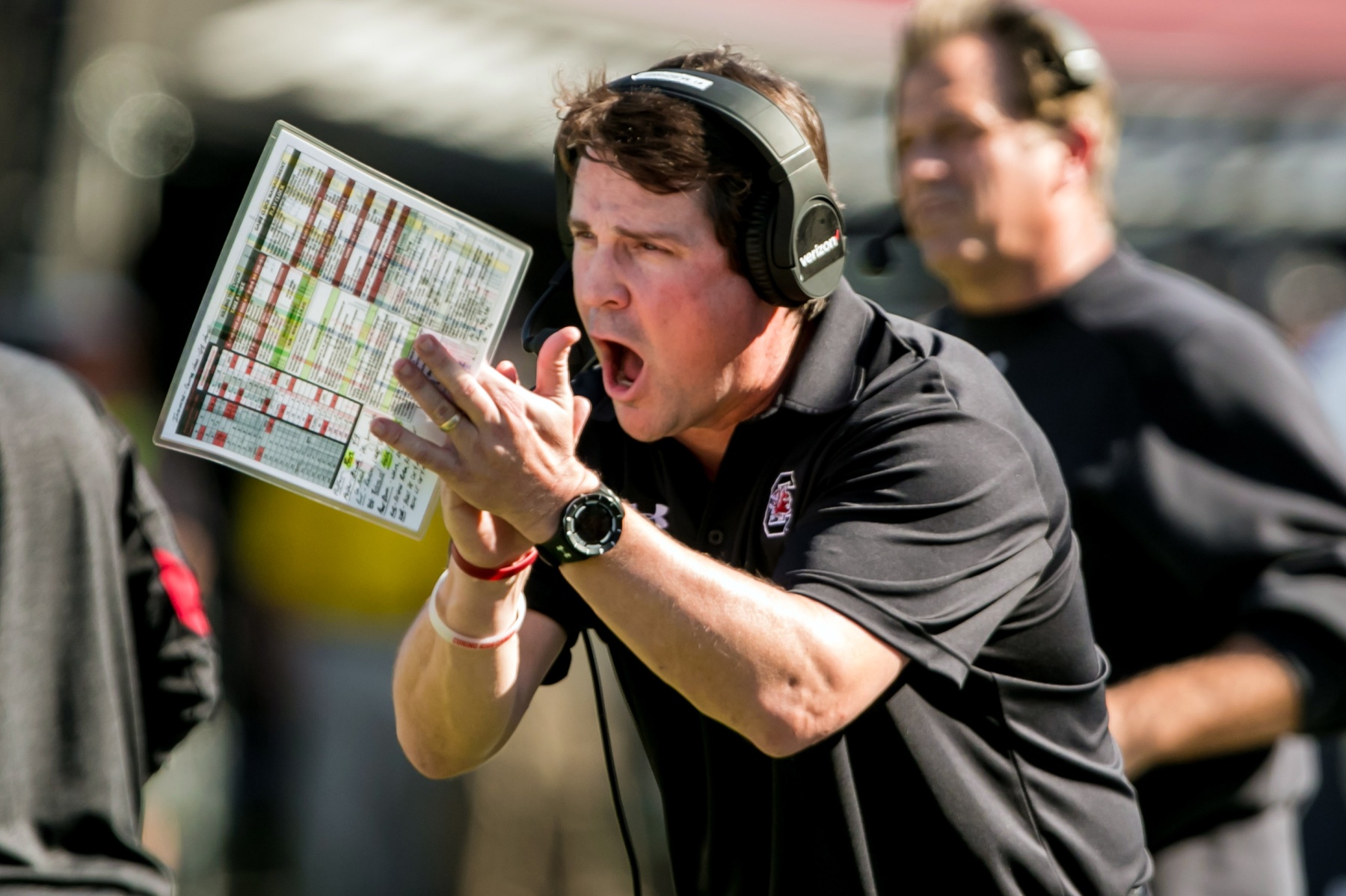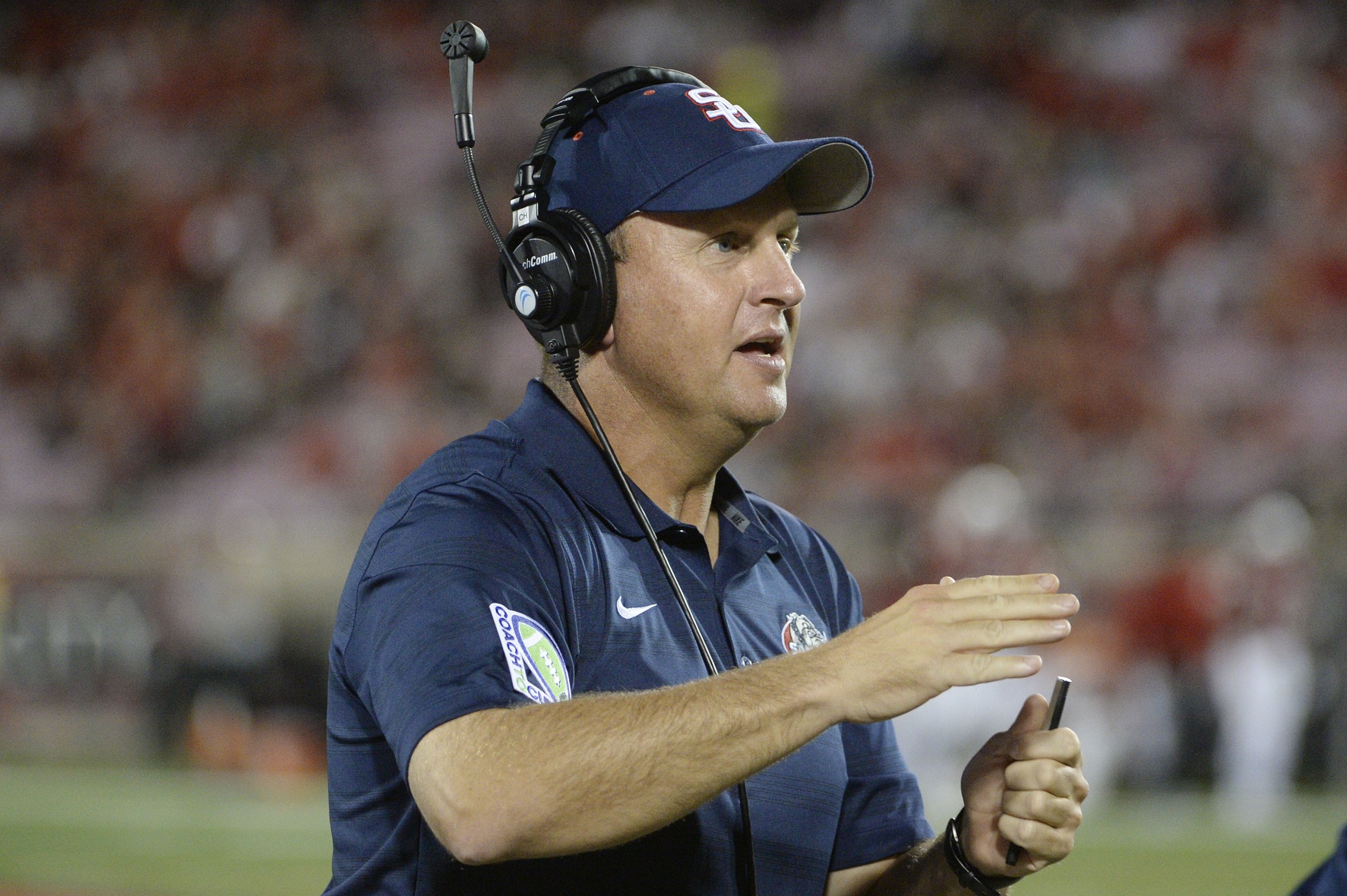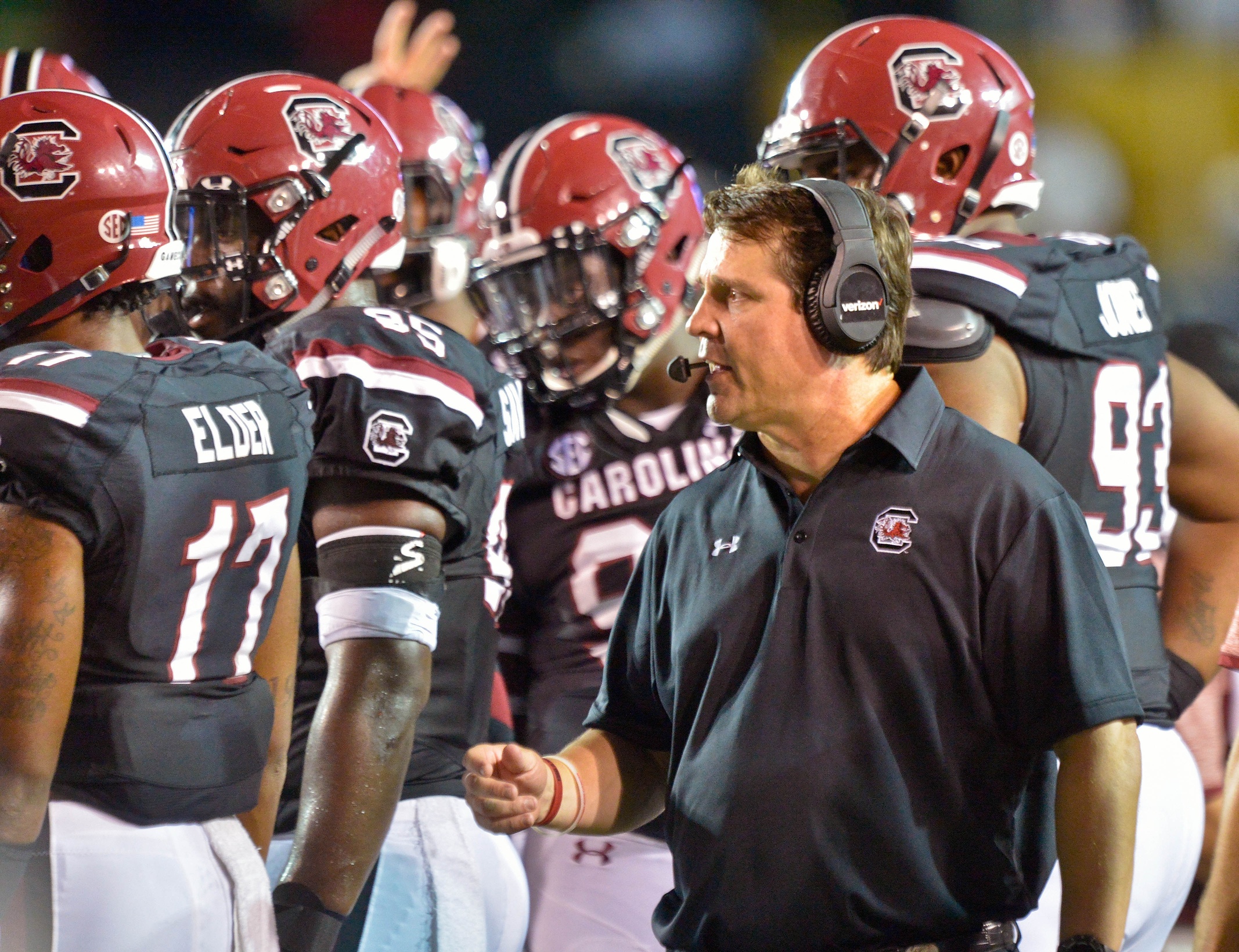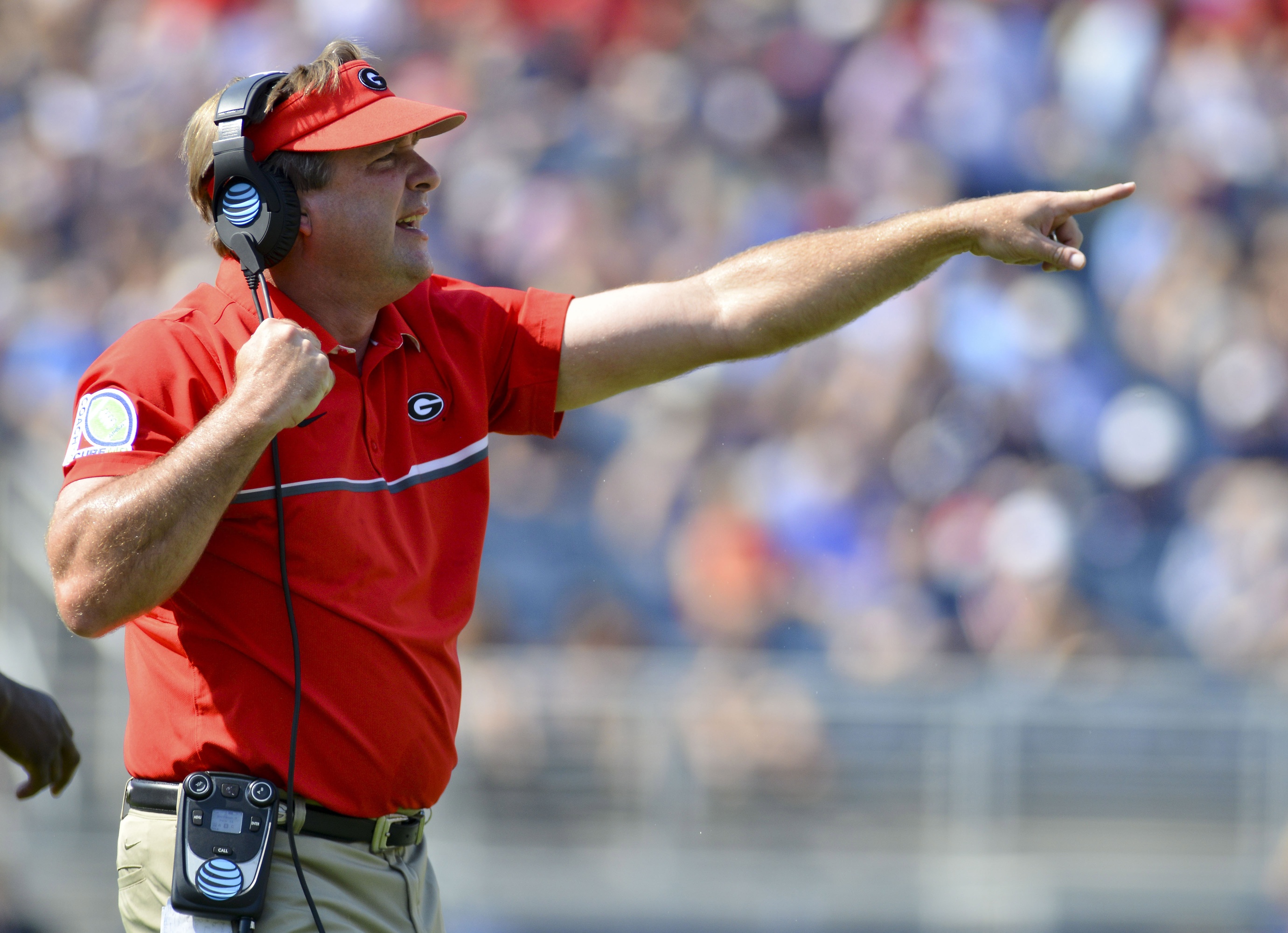From teammates to colleagues to rivals: Get ready for Kirby Smart vs. Will Muschamp
By John Crist
Published:
SEC Media Days were a pretty drab affair this past July. Bored reporters asked boring questions to bored coaches and got boring answers.
Fortunately for the headline-seeking types, Will Muschamp and Kirby Smart added a little back-and-forth levity to the proceedings. It all stemmed from their time together on the Valdosta State staff back in 2000.
Muschamp and Smart — the former now in his first season at South Carolina, the latter presently in Year 1 at Georgia — were working for Chris Hatcher, who was coaching the Blazers at the time. As Smart tells the story, during his interview he diagrammed a defense for Hatcher with only 10 players on the field.
According to Muschamp, it was actually 12 players and not 10. The two of them still can’t agree on the tale to this day.
“I hope he coaches as well as his memory is because it’s not very good,” Muschamp joked.
“Later that day we played a pickup basketball game, and me and Coach Hatcher beat his eyes out,” Smart retorted, highlighting a part of the anecdote that Muschamp conveniently never mentions.
The two of them have a long history together. Their playing careers at Georgia only overlapped in 1994, when Muschamp was a senior captain and Smart was just redshirting. They both played the safety position.
However, Muschamp was on one practice field as a starter and Smart was on another as a member of the scout team. They didn’t have much of an opportunity to interact with each other. When Smart began suiting up in 1995 — he even returned kicks as a freshman — Muschamp was already a graduate assistant at Auburn.
While they know one another inside and out as coaches, their memories as fellow Bulldogs are much more faint.
“We were only together one year,” Muschamp said Wednesday on the weekly SEC coaches teleconference when asked about Smart, “but a really good athlete, extremely bright and a guy that obviously had a great, great career there at Georgia and was an outstanding player for Georgia.”

“I don’t remember him much as a player,” Smart said of Muschamp on the teleconference. “I was a true freshman. He was a senior, captain, leader on the team. He made some plays that year, I do remember that. Maybe I got hit in the head too many times. I don’t remember a whole lot of him as a player because I wasn’t even traveling.”
Muschamp is rebuilding a Gamecocks team that fell off a cliff during Steve Spurrier’s abbreviated swan song. At 2-3 and with ranked foes Tennessee, Florida and Clemson still on the schedule, bowl eligibility is a long shot.
As for Smart, now 3-2, he needs to pick up the pieces from last Saturday’s stake to the heart. After UGA took a 31-28 lead with 10 seconds left — a few ticks away from seizing control of the East — Tennessee delivered the play of the year so far in the SEC with a Hail Mary touchdown to steal a 34-31 win.
They square off Sunday for the first time as head coaches. Neither envisioned such a scenario back at Valdosta State.
“We worked together at Valdosta for a year and then at LSU for a year, but Kirby is a good person,” Muschamp said. “He does a great job relating with players and people. That’s what makes him a good recruiter. Obviously, he’s extremely bright and he’s got a great work ethic. So those are all pretty good qualities that you want in a coach, and he’s done a fantastic job and had some of the best defenses in college football. He’ll do a great job at Georgia.”
“We both kind of grew up in the coaching profession and grew up around athletics,” Smart said. “His father being very involved and my father being very involved, so we were both high-energy and hard-nosed coaches that got after it. The drive was there, but I don’t know that you could say that it would be inevitable that we would end up where we are.”
Muschamp and Smart are products of the ever-growing coaching tree of Alabama’s Nick Saban. Some of its many branches include the likes of Florida’s Jim McElwain, Florida State’s Jimbo Fisher and Michigan State’s Mark Dantonio.
But what about Hatcher’s coaching tree? Currently the head coach at Samford, he went 76-12 in seven seasons at Valdosta State and won a Division-II national championship in 2004. While Muschamp and Smart eventually came into full bloom for Saban, Hatcher deserves some credit for helping plant the initial seeds.
Hatcher took some time off from preparing for Samford’s game Saturday against Furman to discuss his two disciples with SDS.
Saturday Down South: We love to talk about coaching trees these days. Bill Belichick has one. Nick Saban has one. Urban Meyer has one. Do you have your own coaching tree, and are Will Muschamp and Kirby Smart on it?

Chris Hatcher: Well, I don’t consider having my own tree. I just consider being a very lucky guy that’s had a lot of young coaches work with me as I was the head coach that have gone on and done some outstanding things.
The thing is, I had nothing to do with Kirby and Will’s success. They were already really good coaches when they coached for me at Valdosta. But I guess the only thing I say is, we did give Will his first chance to be the D-coordinator, and of course he’s taken full advantage of that. We gave Kirby his first job, and he’s taken really good advantage of that.
Back then, we were all about 25, 26 years old. We didn’t know anything. We didn’t know where this profession would take us. We just loved to coach and be on a football team. I’m really proud for both of those guys. They’re good men. They’re excellent coaches, and it’ll be an interesting game this weekend seeing those two square off.
SDS: We know the story of how Smart came to be in your employ with the infamous incident on the white board. But how did Muschamp become a part of your staff?
CH: I met Will a couple times, and he was coaching at Eastern Kentucky. I was the quarterback coach at the University of Kentucky, and we had talked a little ball over the course of our time being only 20 minutes away. When the Valdosta job came open and I got it, Will reached out and expressed interest in being the defensive coordinator. And of course I didn’t have one, didn’t have one in mind at the time.
After interviewing him, it took probably five minutes to know that he knew what he was talking about and he was my kind of guy.
I credit him and Kirby both with the reason that Valdosta State was so successful from 2000 to 2010. They set a great foundation down there for defense. I really believe they had a lot to do with the three national championships that were won during that period.
SDS: Muschamp is arguably the most animated coach in college football. The internet has certainly had some fun at his expense. Is the guy we see on television today the same one you remember from all those years ago?
CH: I haven’t been around him now, so I’m not with him day to day, but he was a fiery competitor when he was coaching at Valdosta. Just a great desire to win, and he wears his emotions on his sleeve. He did that way back when.
But the guys really loved him. They know that he cared about him. I don’t believe while I was there that we had any player not have the utmost respect for Will Muschamp.

SDS: As you mentioned before, you gave Smart his first real job in coaching. Previously, he was just an administrative assistant at Georgia. Was there a moment when the light came on and you realized that he had found his calling in life?
CH: I don’t know if I ever had the “aha” moment. You don’t look at things like that. You’re just trying to put together a staff, put together a team. It was my first head coach job, so I didn’t know what I was doing.
He was a tremendous player. He came from a coaching pedigree with his daddy being an excellent high school coach. Just a very smart player, really worked hard at it. After Will left, he had shown that he had what it took to be a good football coach. Actually, he was the DB coach the first year, and the second year we promoted him to defensive coordinator.
The thing I remember most, and I laugh about it now, is that back then we ran one defense the entire year. And we were second in the country in total defense. Then he gets with Coach Saban, and they probably ran like 50 different defenses during the game. Things have changed, but he’s an excellent coach. He’s a tremendous competitor as well, and I think that’s what made him successful.
SDS: Smart gives the impression that he’s all business. Was he the same way when he first got started, or could that perhaps be a product of him being around the similarly buttoned-up Saban for so many years?
CH: You guys see those guys in a different light than I do. Kirby’s a fun guy. Will’s a fun guy. If down at hunting camp somewhere, those two guys would be two of my first choices to be with me. I don’t look at them that way. I guess maybe just because we worked together, when all of us were getting our first start in this profession.
I think both of them are good people. You’d like to hang out with both of them. They’re really fun to be around. They do have a job to do. It’s a high-pressure job, as we all well know. There’s a lot of responsibility. Especially this time of year, you just get so focused on just trying to get your team ready to play each week that sometimes you don’t even know what day it is. They’re both good guys. They really are.
I think whatever perception anybody has of them, if you really knew them and you got to hang out with them, they’re just like regular old people that you’d like to be your friends.
SDS: How often does a young assistant coach look to have real promise in the profession, but he’s forced to leave and find a more traditional way to make a living? Guys are paid so little in the beginning and have to move their families every other year just to get ahead.
CH: I think it’s about timing, and you have a little bit of luck. Kirby, he went from being the defensive coordinator at Valdosta State then right to a graduate assistant at Florida State. It turned out really well for him. I just think that you’re at the right place at the right time. If you have the skill and the desire and a little bit of luck, good things can happen to you.

I tell you, not only those two, but you take Valdosta State in general. When I played there, my head coach was (future Kentucky coach) Hal Mumme. My offensive line coach was (future Kentucky and Baylor coach) Guy Morriss. Our offensive coordinator was (current Washington State coach) Mike Leach. And then the volunteer coach, who slept on the couch, was a young guy named (current West Virginia coach) Dana Holgorsen.
That place down at Valdosta was very fortunate that it had some really good coaches come through, and you’ve got to give a lot of credit to their AD, Herb Reinhard, who’s been instrumental in hiring all those guys. Valdosta is a little bitty cradle of coaches down on the Georgia borderline.
SDS: Just how astronomical are the odds for an assistant at a small school, making next to no money and having zero job security, to eventually end up as a head coach at a premier program making millions? I read somewhere that you paid Smart only $8,000 his first year.
CH: Kirby and Will and myself, we talk about it all the time. If a school like Valdosta had the resources to pay you a good salary … those couple years were the most fun we’ve ever had. Of course, we had great players. We won a lot of games. But it was just a lot of fun.
You got to coach football at the smaller levels, you find out that those players are in it to play football. They like to play the game. They like to practice. That’s what makes that level so enjoyable. It’s not about TV. It’s not about getting the stipends. It’s not about having a lot of gear and a bunch of people in the stands. You just enjoy playing the game.
For coaches, it’s a great place to start. And it’s like anything that you do in life. No matter what business you get in or what location you’re shooting for, the expert was once a beginner. You’ve got to start at the very bottom, and you’ve got to be persistent. You’ve got to be disciplined. You’ve got to make sacrifices in how you live.
If you have the dream and goal of moving up in the profession, and start out at $8,000, I would imagine if you asked (Smart) — and I haven’t ever asked him this — but that was probably a pretty good investment for him looking back on it now.
SDS: They both make more than $8,000 per day now. You’ve enjoyed a great career yourself as a head coach, from Valdosta State then to Samford now. Have you ever thought about working for Muschamp or Smart in some capacity one day?
CH: I thought about it. They may not want me on their staff. I’ve never asked them. We kind of took different career paths, the three of us. I became the head coach. I enjoyed being the head coach at a small school. They had bigger aspirations, which has worked out really well for them.
I would entertain the idea if they ever thought that I could help them in any way, form or fashion, but those guys are really good coaches. They’re really good people. They deserve the success they’ve gotten. The only common link that I have with them is that they worked on my first staff at Valdosta State. I had nothing to do with their success other than the three of us that old God put us together for those two years, so I can’t take any credit whatsoever for what they’ve accomplished. And I wish them both the best. I pull for both of them.
This weekend, I know one of them’s got to win. So I hope it’s a 3-2 ballgame since they’re both defensive guys. I’m not real sure which one I want to win or not.
John Crist is the senior writer for Saturday Down South, a member of the FWAA and a voter for the Heisman Trophy. Send him an e-mail, like him on Facebook or follow him on Twitter.
John Crist is an award-winning contributor to Saturday Down South.







